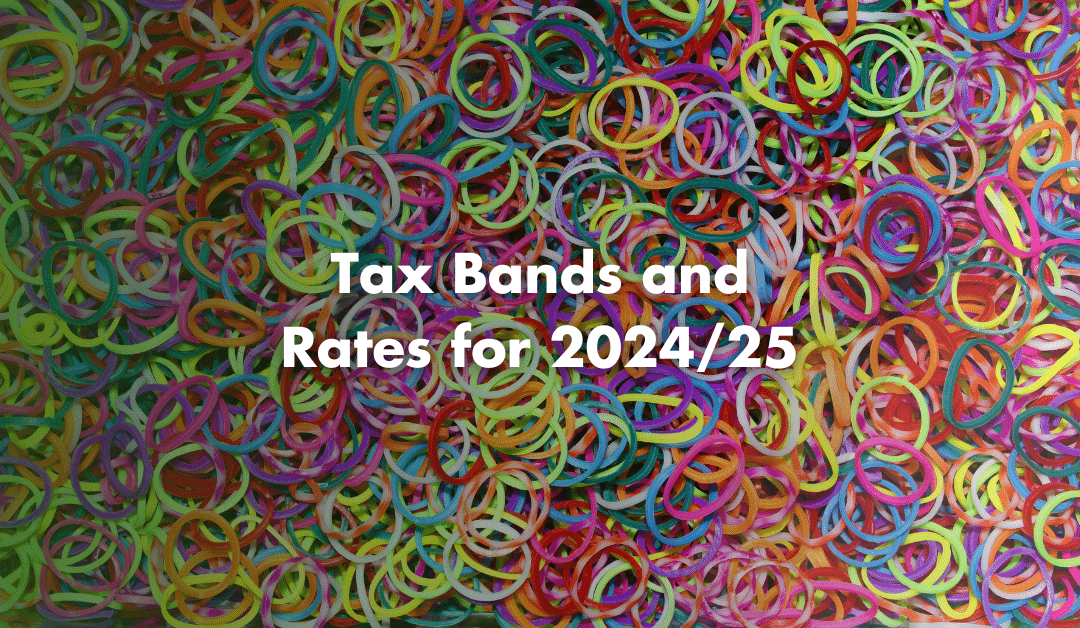Tax in the UK follows a progressive structure, meaning the more you earn, the higher the percentage of tax you pay on the additional income. This blog covers the tax bands, allowances and rates for the 2024/25 and 2025/26 tax years.
Your Tax-Free Personal Allowance
Your Personal Allowance is the amount you can earn before you start paying Income Tax.
- 2024/25 – £12,570
- 2025/26 – £12,570
If you earn over £100,000, your Personal Allowance decreases by £1 for every £2 of income above that limit, disappearing completely at £125,140.
For couples, the Marriage Allowance allows a lower-earning spouse to transfer £1,260 of their Personal Allowance to their partner, therefore reducing their tax bill.
If you are registered blind, you may qualify for the Blind Person’s Allowance, which provides an extra tax-free amount.
Income Tax Bands and Rates
| Tax Band | 2024/25 Income Range | Tax Rate |
|---|---|---|
| Personal Allowance | Up to £12,570 | 0% |
| Basic Rate | £12,571 to £50,270 | 20% |
| Higher Rate | £50,271 to £125,140 | 40% |
| Additional Rate | Over £125,140 | 45% |
These bands and rates remain currently unchanged in 2025/26.
National Insurance Contributions
Employees and self-employed workers pay National Insurance, which funds benefits such as the State Pension.
Employees (Class 1 National Insurance Contributions)
- 8% on earnings between £12,570 and £50,270
- 2% on earnings above £50,270
Employers (Class 1 National Insurance Contributions)
- 13.8% on earnings above £9,100 in 2024/25
- 15% on earnings above £5,000 in 2025/26
Self-Employed (Class 4 National Insurance Contributions)
- 6% on profits between £12,570 and £50,270
- 2% on profits above £50,270
NOTE – Class 2 National Insurance Contributions were abolished from April 2024.
Capital Gains Tax Bands and Rates
Capital Gains Tax applies when you sell an asset for a profit.
| Taxpayer Status | Gains from Property | Gains from Other Assets |
|---|---|---|
| Basic Rate | 18% | 18% (10% before 30th October 2024) |
| Higher Rate | 24% | 24% (20% before 30th October 2024) |
| Trustees | 28% | 24% |
The annual Capital Gains Tax exemption also remains at £3,000.
Corporation Tax
Corporation Tax applies to company profits.
- Profits up to £50,000 – 19%
- Profits over £250,000 – 25%
- Marginal Relief applies to profits between £50,000 and £250,000
Companies can reduce their tax liability through Capital Allowances and R&D tax reliefs.
Dividend Tax Bands and Rates
If you earn Dividends from shares, you will pay tax above the Dividend Allowance.
- Allowance – £500
- Basic Rate – 8.75%
- Higher Rate – 33.75%
- Additional Rate – 39.35%
VAT Rates and Thresholds
- VAT Registration – £90,000
- VAT Deregistration – £88,000
- Standard VAT Rate – 20%
- Reduced VAT Rate – 5%
- Zero VAT Rate – 0%
VAT applies to most goods and services, except for exempt and zero-rated items.
National Minimum Wage and National Living Wage
| Age Group | 2024/25 Rate | 2025/26 Rate |
|---|---|---|
| Apprentices / Under 18s | £6.40 per hour | £7.55 per hour |
| 18 to 20 Years | £8.60 per hour | £10.00 per hour |
| 21+ (National Living Wage) | £11.44 per hour | £12.21 per hour |
Contact Us
We are not just accountants; we are Chartered Accountants with one of the most reputable and premium accounting bodies. We are registered and regulated by ACCA; so you can rest assured that you are in good hands. Knowing this, don’t hesitate to get in touch with us if you require assistance with tax planning or any of the points mentioned above: Pi Accountancy | Contact Us

